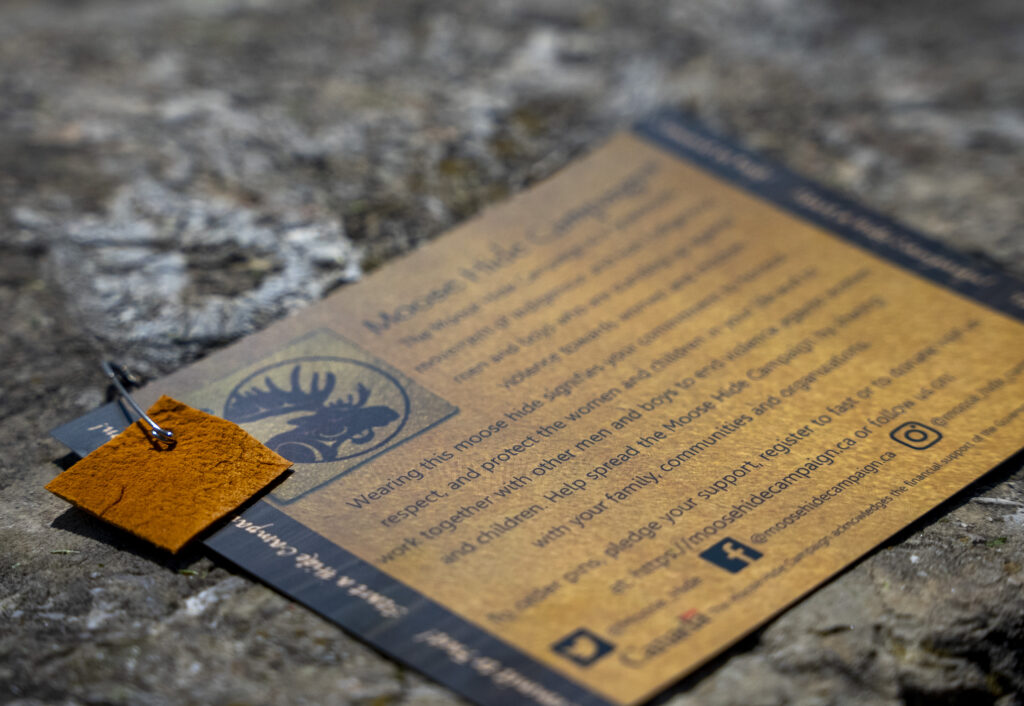Flags were lowered, red dresses were displayed, and medicines were lit at NC campuses on May 5 as a tribute to lives lost and forever impacted by colonial violence.
Organized by Indigenous Education, the initiatives were honour of Red Dress Day, a national day of awareness for Missing and Murdered Indigenous Women, Girls, and Two-Spirited people in Canada.
Niagara College has been dedicated to raising awareness of MMIWG2S through its involvement in the REDress project since 2021, in partnership with Brock University. Most recently, the College hosted dress displays and a virtual event for the REDress Project in mid-February with outdoor displays and a virtual event in partnership with Brock University.
Director of Student Services Lianne Gagnon said that Red Dress Day and the REDress Project are important tributes to victims and survivors, and acknowledge the impacts that violence has on families, friends and communities. They also serve as opportunities for the NC community to learn more about the National Inquiry on Missing and Murdered Indigenous Women and Girls, and its 231 Calls for Justice.
“It’s only by shining a light and providing information that we can take the steps to expose the truth of the violence. That’s why we feel it’s so important to educate our students and staff about the violence perpetrated against Indigenous women, girls, and 2SLGBTQQIA+ people, in the hope of eliminating it,” said Gagnon. “As a postsecondary provider in Niagara, we are proud to stand with our partners at Brock and take a lead role in informing our communities to end the violence and work towards a more diverse and inclusive future for all.”
Each dress on display served as a powerful visual reminder of a MMIWG, Two Spirit, Lesbian, Gay, Bisexual, Transgender, Queer, Questioning, Intersex and Asexual (2SLGBTQQIA+) victim or survivor from the past 40 years.
NC has been dedicated to raising awareness for Missing and Murdered Indigenous Women, Girls, and Two-Spirited people in Canada through its involvement in the REDress project since 2021, in partnership with Brock University. Most recently, in February, they hosted dress displays and a virtual event for the REDress Project.
The REDress Project was inspired by an art installation featuring red dress displays by Métis artist Jamie Black in 2011 and has since been replicated in communities across Canada.
Watch YourTV Niagara video
Moose Hide Campaign

Pinning their hopes on ending violence against women and children, Niagara College hosted its first Moose Hide Campaign event on May 12, in partnership with Brock University.
Held on Moose Hide Campaign Day, the day of ceremony calls for all Canadians — Indigenous and non-Indigenous – to take a stand against violence towards women and children, and take practical steps for a collective journey of reconciliation.
Staff, students and community residents were welcome to drop by throughout the day at the Daniel J. Patterson Campus in Niagara-on-the-Lake and gather at the Indigenous Gardens where a sacred fire was lit. Participants were invited to take a pledge to honour, respect and protect the women and children in their lives, to work to end gender-based violence, and take action towards reconciliation with Indigenous peoples. Those who pledged received a moose hide pin as a symbol of their commitment.
“Similar to our Red Dress initiatives, we want to bring more awareness about violence perpetrated against Indigenous women and girls, and the Moose Hide Campaign event is an opportunity for all people to participate and take a stand against this violence,” said Gagnon. “By partnering with Brock University, as the two higher education institutions in Niagara, we are poised to educate our communities about this, and encourage our students and colleagues to participate.”
The event was led by NC staff members from Indigenous Education, and the Student Rights and Responsibilities Office (SRRO), Brock Aboriginal Recruitment/Liaison Officer Sam Charal, and Indigenous Elder, NC alumnus Dave Labbe.
“We gather together in support of the Moose Hide Campaign in order to support Indigenous women and children and advocate against domestic violence,” said Charal. “Our fire represents a way for Indigenous people and allies to gather in a way that aligns with the seven grandfather teachings in support of this event.”
NC Student Rights and Responsibilities Manager Hafsah Shaikh said that the SRRO joined Moose Hide Campaign event to support reconciliation and to help end violence against all women and children.
“Sexual and gender-based violence can affect anyone; however, we know that the rate of sexual assault against Indigenous women and girls is approximately three times higher than among non-Indigenous women,” said Shaikh. “It takes a community to speak out about violence to eliminate it, and to stand with those who have experienced these crimes.”
The Moose Hide Campaign was founded on the side of the Highway of Tears in British Columbia, in response to the injustices and violence faced by women and children in Canada, particularly those who are Indigenous. Since it began 11 years ago as a grassroots group of men and boys, it has grown into a national ceremony for all Canadians to end violence against all women and children, and more than three million moose hide pins have been distributed across the country. Learn more at moosehidecampaign.ca




